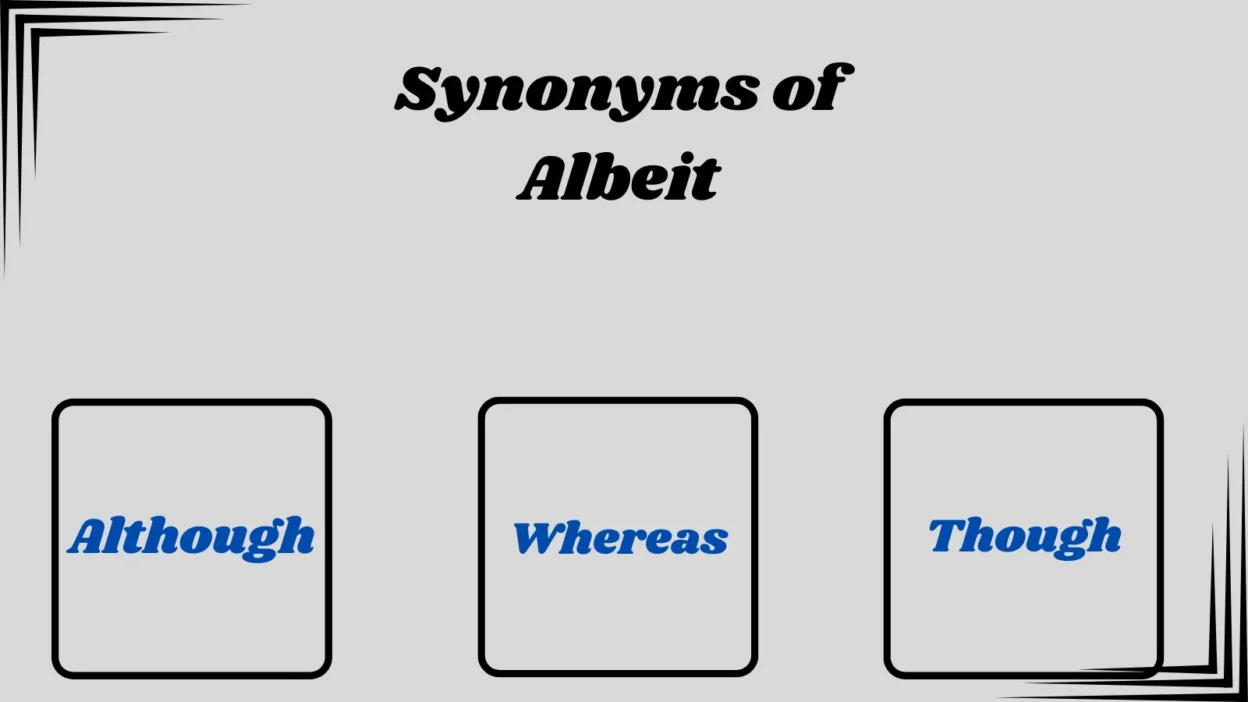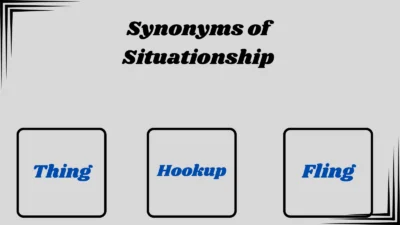Synonyms of albeit help you introduce a contrast or concession, such as although, even though, or though. For example, she accepted the job, albeit with some hesitation. Using the right synonym of albeit lets you smoothly connect ideas while acknowledging exceptions or contradictions. Each word adds a slightly different tone, from formal to conversational.
Whether writing essays, stories, or reports, choosing precise synonyms for albeit helps your writing flow naturally and clearly.
In this article, you’ll get the meaning and example sentence for each synonym of albeit, so you can express contrasts like a pro. Ready to master these subtle connectors? Let’s dive in!
What Does Albeit Mean?
Albeit is a conjunction that means “although” or “even though.” It introduces a contrast or concession to a previous statement. Unlike the straightforward “although,” albeit tends to carry a tone that is a bit more modest, reserved, or refined. It’s often found in formal or literary contexts, giving your sentence a subtle elegance.
Example:
- She was tired, albeit happy, after the long journey.
Here, albeit gently acknowledges the tiredness but highlights the overriding happiness.
30 Synonyms of Albeit: When and How to Use Them
1. Although
Meaning: Directly introduces a contrast.
Tone: Neutral, widely used.
Example: Although it was raining, we went hiking.
Use: Every day writing and speech.
2. Though
Meaning: Similar to although, often more informal.
Tone: Casual to semi-formal.
Example: I liked the movie, though it was a bit long.
Use: Informal contexts and conversations.
3. Even though
Meaning: Stronger emphasis on contrast.
Tone: Emphatic and clear.
Example: Even though she was nervous, she gave a great speech.
Use: When you want to highlight the concession.
4. Whereas
Meaning: Contrasts two different facts.
Tone: Formal and precise.
Example: He prefers tea, whereas I like coffee.
Use: Comparing two subjects or ideas.
5. While
Meaning: Expresses contrast, often in a mild way.
Tone: Neutral.
Example: While he enjoys sports, she prefers reading.
Use: Casual and formal contexts.
6. Notwithstanding
Meaning: Despite the fact, formal.
Tone: Formal and legalistic.
Example: Notwithstanding the difficulties, they succeeded.
Use: Formal writing, legal documents.
7. Altho (informal)
Meaning: Short for although, very casual.
Tone: Very informal, slangy.
Example: I liked the show, although it was predictable.
Use: Informal texting or casual speech.
8. Despite
Meaning: Despite something.
Tone: Formal and neutral.
Example: Despite the rain, the picnic went on.
Use: When focusing on the obstacle or situation.
9. In spite of
Meaning: Same as despite, but more conversational.
Tone: Neutral.
Example: In spite of his age, he runs marathons.
Use: Every day use with a slightly softer tone.
10. Yet
Meaning: Introduces a surprising contrast.
Tone: Neutral but can add a twist.
Example: She was tired, yet she kept working.
Use: To emphasize unexpected contrast.
11. However
Meaning: Used to introduce a statement contrasting with a previous one.
Tone: Formal, often used in writing.
Example: The plan was risky; however, it worked.
Use: Formal writing and argumentation.
12. Still
Meaning: Despite that, continuing in contrast.
Tone: Informal to neutral.
Example: It was cold, still we went swimming.
Use: Spoken English or narrative.
13. Though yet
Meaning: Combination for emphasis, old-fashioned.
Tone: Literary or poetic.
Example: Though yet untrained, she played beautifully.
Use: Poetry, formal writing.
14. Albeit that
Meaning: More formal way of saying albeit.
Tone: Formal, literary.
Example: The project succeeded, albeit that it took longer than expected.
Use: Academic or formal writing.
15. Only that
Meaning: Introduces a minor contradiction or exception.
Tone: Slightly old-fashioned or literary.
Example: I would agree, only that I lack the evidence.
Use: Formal and written contexts.
16. Nevertheless
Meaning: In spite of that, nonetheless.
Tone: Formal and emphatic.
Example: She was tired; nevertheless, she continued.
Use: Formal writing and speeches.
17. Nonetheless
Meaning: Same as nevertheless, slightly softer.
Tone: Formal.
Example: The task was hard; nonetheless, he finished it.
Use: Formal or semi-formal contexts.
18. Altho’
Meaning: Abbreviated and old-fashioned form of although.
Tone: Literary or historical.
Example: Although the night was dark, they saw the stars.
Use: Classic literature or poetic style.
19. Be that as it may
Meaning: Acknowledges a point but introduces a contrast.
Tone: Formal, conversational.
Example: Be that as it may, we must continue the work.
Use: Argumentative or polite conversation.
20. Granted that
Meaning: Accepting something is true but introducing contrast.
Tone: Formal or semi-formal.
Example: Granted that he’s young, he’s very capable.
Use: Debates or formal writing.
21. Admittedly
Meaning: Concedes a point before adding contrast.
Tone: Formal, honest tone.
Example: Admittedly, it was a tough decision.
Use: Academic or reflective writing.
22. Except that
Meaning: Introducing an exception.
Tone: Neutral to informal.
Example: I liked the movie, except that it was too long.
Use: Everyday speech or writing.
23. Save that
Meaning: A Formal way to introduce an exception.
Tone: Formal, literary.
Example: I would agree, save that the facts differ.
Use: Formal writing or speeches.
24. But
Meaning: Simple conjunction indicating contrast.
Tone: Neutral, very common.
Example: I wanted to go, but I was too tired.
Use: All contexts.
25. Conversely
Meaning: Introduces an opposite idea.
Tone: Formal or academic.
Example: He loves jazz; conversely, she prefers rock.
Use: Analytical writing or debates.
26. Alternatively
Meaning: Presents an alternative or contrast.
Tone: Formal or neutral.
Example: We can take the train; alternatively, we can drive.
Use: Formal or business contexts.
27. In contrast
Meaning: Shows a clear contrast between two ideas.
Tone: Formal or descriptive.
Example: In contrast to her sister, she is very outgoing.
Use: Essays, reports.
28. Albeit with
Meaning: Like, albeit but specifying conditions.
Tone: Formal.
Example: The team won, albeit with some difficulty.
Use: Formal writing.
29. Only
Meaning: Often introduces a minor correction or exception.
Tone: Informal to formal.
Example: I would have called, only I lost my phone.
Use: Everyday conversation or writing.
30. Though still
Meaning: Emphasizes a continuing contrast.
Tone: Literary or formal.
Example: Though still inexperienced, he showed promise.
Use: Narrative or formal writing.
How to Choose the Right Synonym
- Tone matters: Use albeit, notwithstanding, or whereas for formal or literary writing. Opt for though, although, or but for everyday conversation.
- Strength of contrast: Use even though or although when you want to emphasize the contrast strongly; choose while or whereas for mild contrasts.
- Contextual fit: If you want to highlight an exception, except that, only that, or save that work best.
- Cultural nuance: Some formal terms like notwithstanding and save that are common in legal English and British English, but less so in casual American English.
- Emotional tone: For a modest, subtle concession, albeit is ideal. For a more direct or emotional contrast, even though or yet can be stronger.
Conclusion
Albeit is a nuanced and elegant word that introduces contrast in a modest, reserved way. Its 30 alternatives give you a broad spectrum—from casual to formal, subtle to emphatic, simple to literary—allowing you to tailor your writing’s tone perfectly.
By understanding these subtle differences, you can confidently choose the right synonym for any situation, enhancing your writing’s clarity and style.
So next time you want to say “although” but with a bit more flair or precision, you’ll know exactly which word to pick!



